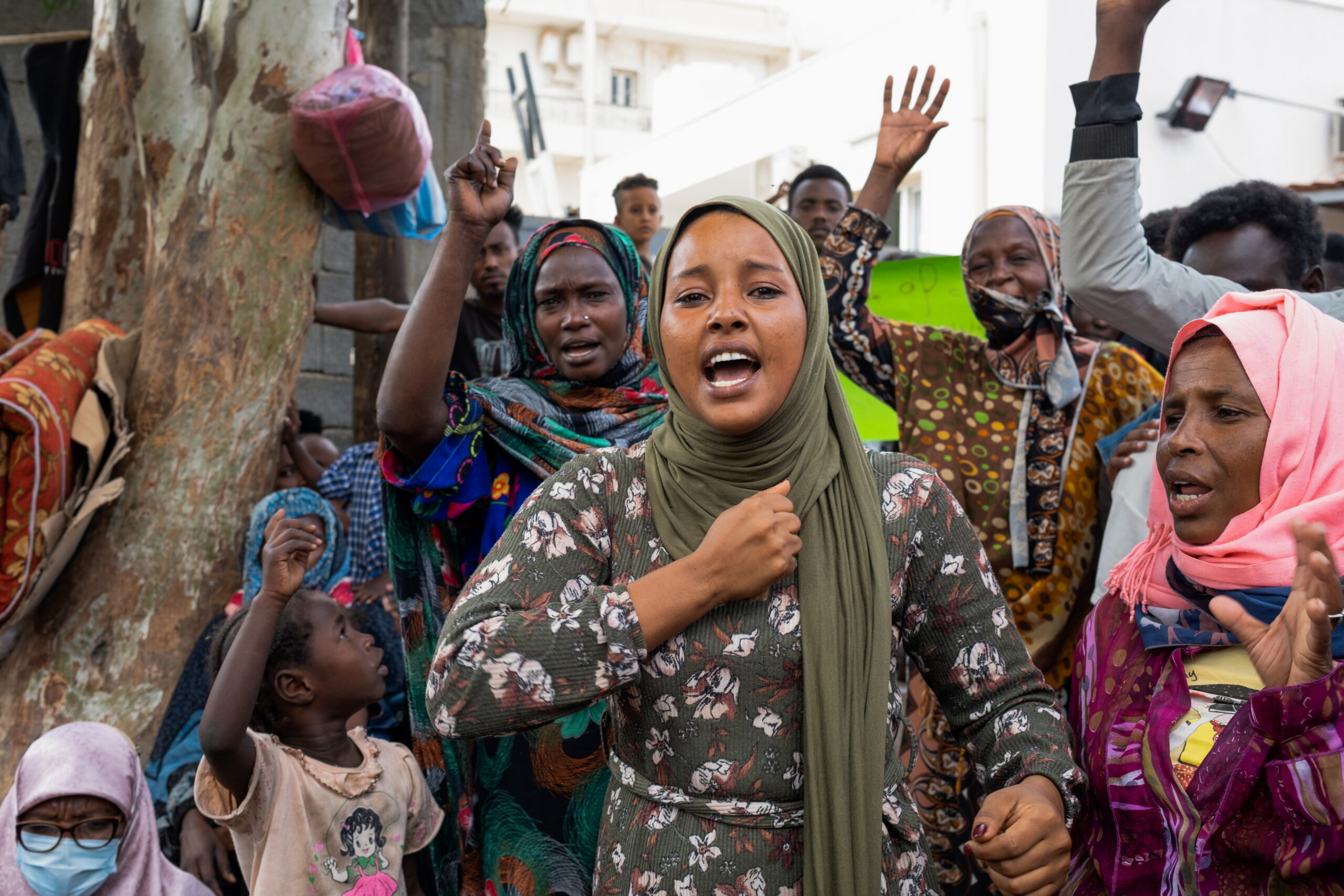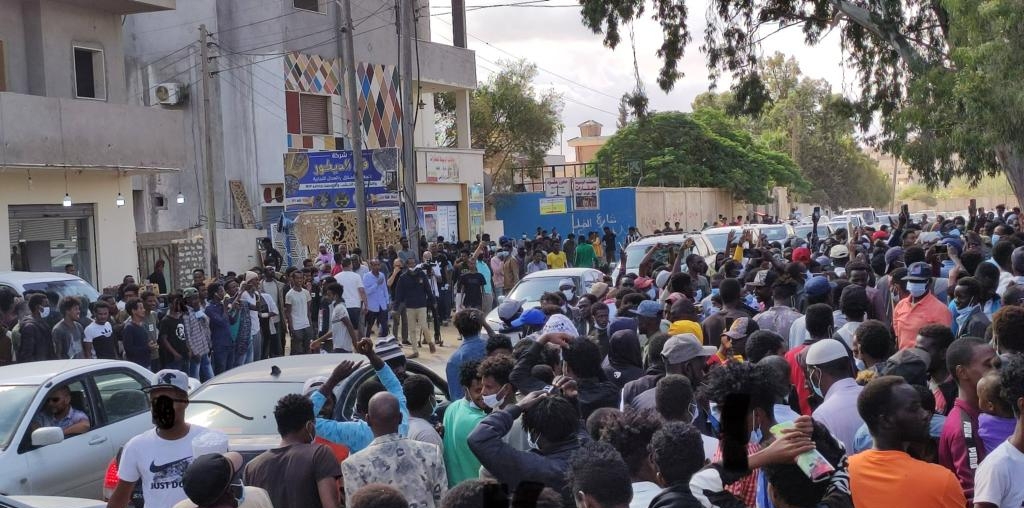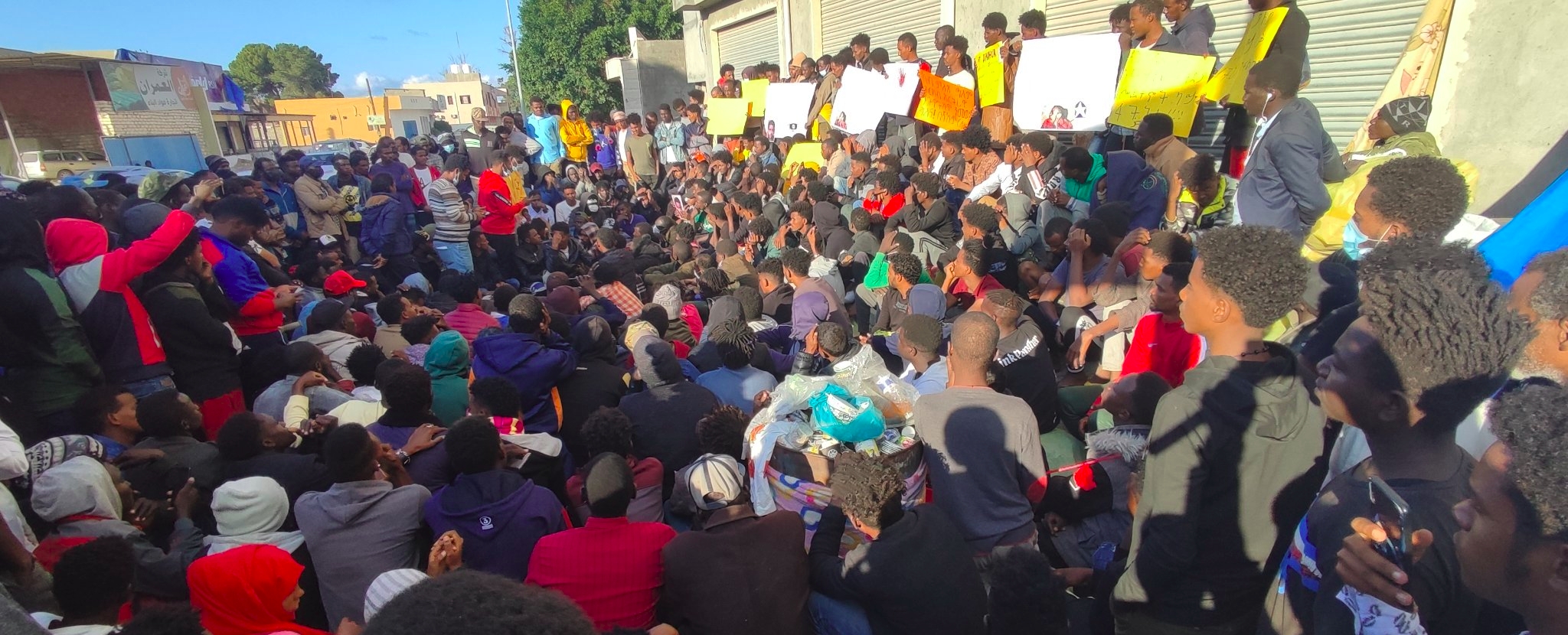In Libya, Migrants Are Organising Against Europe’s Border Brutality
Thousands have camped out at UN offices.
by Lucia Pradella
24 December 2021

At the beginning of October, west Libyan authorities carried out a brutal crackdown on the thousands of immigrants, refugees and asylum seekers living in Gargaresh, on the outskirts of Tripoli. More than 5,000 people were arrested, their homes destroyed, families captured and separated; people were hurt, violated and even killed. Four thousand people were imprisoned in the overcrowded Al-Mabani detention centre.
Immigrants and refugees, however, are not just accepting their treatment – they’re collectively organising against it. Barely reported in the western press, their resistance is exposing the imperial logic underlying Europe’s border brutality. Immigrant self-organisation, if supported by sympathetic workers in Europe, could be the wedge needed to fracture the EU’s border imperialism.
The spark of resistance.

When the guards attacked a Sudanese immigrant on hunger strike on 9 October this year, the detainees rebelled, broke out and escaped. According to the UN, at least 10 people were shot dead and many more wounded during two separate liberation attempts in early October.
The hundreds who escaped joined the permanent occupation that thousands of immigrants had started in front of the UN High Commissioner for Refugees (UNHCR) office in Tripoli. They self-organised and started a peaceful demonstration calling for evacuations and asking the Libyan authorities to set the detainees free. Some formed the group Refugees in Libya. After three months, about 1,600 immigrants and refugees are still camping in front of the UNHCR Headquarters.

Even if the UNHCR is an agency mandated to aid and protect refugees and assist in their repatriation or resettlement, the organisation’s branch in Libya closed its doors and suspended all activities in its community day centre (which they are planning to close). It left thousands of people in dire need of shelter, food and medical treatment, exposed to traffic accidents and the violence of armed groups and of the Libyan authorities. Despite initial frictions with local citizens alarmed by the health crisis amplified by the occupation, some, Refugees in Libya said, also showed their sympathy and donated food.
UNHCR Libya argued they would only evacuate the protesters and press for the release of the other detainees if the protesters dispersed. The EU and the UK government, despite their deep involvement in and culpability for the Libyan disaster, have been silent and haven’t delivered any assistance.
Thanks to the pressure from below, however, the UNHCR restarted its (very limited) evacuation flights, which had been halted by the Libyan authorities for more than a year, and secured the release of 115 detainees in November. But they are leaving most immigrants and refugees subject to the whims of the Libyan authorities, who are using all means to terrorise the protesters back into captivity.
The logic of European border imperialism.
The terrible conditions of African immigrants and refugees in Libya are well known, including slave auctions, arbitrary arrests, indefinite detention, extortion, sexual violence, torture, forced labour and murder.
The situation got worse in the wake of the Covid-19 pandemic, which disrupted the economic systems of North African countries. During the second Libyan civil war (2014-20), combatants had intentionally targeted hospitals, water facilities and detention centres. It’s well known that the west Libyan authorities – in many cases armed groups implicated in fuel, weapons and human smuggling – are part and parcel of this system of violence and abuse. They have the strong support of the EU, which relies on them to help militarise its borders in the Mediterranean.
The so-called Libyan hell is often presented as a necessary evil to prevent African immigrants from coming to Europe and pushing down wages and conditions, threatening the “European way of life”.
What is less known are the demands of the immigrants and refugees themselves. A few days ago, I talked to a spokesperson of Refugees in Libya. Although they are demanding immediate evacuations to any safe country and the abolition of the Libyan coastguard, he told me, it’s important to understand that only a small minority want to go to Europe. Most want to stay and work in Libya. In this context, the policies implemented by the EU are helping create a super-exploitable workforce in Libya and beyond.
We are being killed,raped,with all violations against our rights & we’ve no rights go talk about it? Why is Libya not held accountable for crimes committed in its territory?
Why is the international community failing us & looking at the other side when we wave our sorrows?@hrw https://t.co/RQD8vS6Vw4 pic.twitter.com/TM6sWwgY9v— Refugees In Libya (@RefugeesinLibya) December 15, 2021
Indeed, the militarisation of the borders in Libya by the EU and the UK government is not aimed at stopping immigration from Africa as such, but is deliberately trapping immigrants and refugees in a terrible system of violence and exploitation.
This system serves the thirst for natural resources of Western states and corporations that, since the 2011 Nato aggression, have been draining billions of dollars out of the country, leaving the population impoverished and subject to corrupt politicians and armed militias. Crucially, this system of neocolonial extraction is also pushing an increasing number of people to leave Libya, creating a reserve army of labour exploitable if and when they reach Europe. The EU and UK’s state policies are actually driving migration, leaving immigrants wretched and exploitable. Brutal as it is, there is an underlying logic to this seeming madness.
This system can only be broken by an alliance of workers in Europe with the self-organising immigrants and refugees in Libya. We must listen to their words:
We are the citizens of this continent and these soils that we travel through, we demand to travel to all African countries freely without obstruction. No African child should be called a migrant in the African Union and member states, we need peace, security, education and infrastructure. The African Union and member states have legal obligations to ensure that we meet these expectations. And not to risk our lives to venture to Europe and other journeys en-route where thousands of lives might end. And the dreams die without seeing the light.
Lucia Pradella is a senior lecturer in international political economy at King’s College London. She has written extensively on Marx’s Capital, imperialism and new workers’ movements in Europe.


